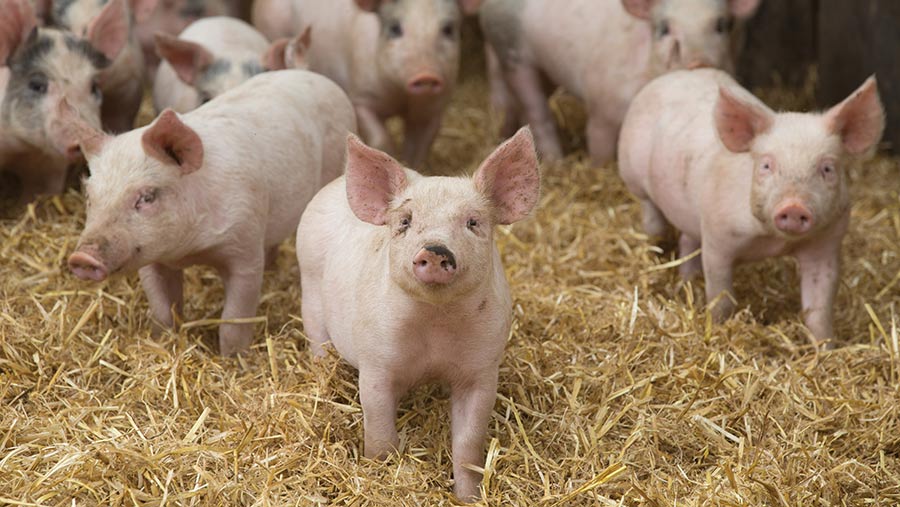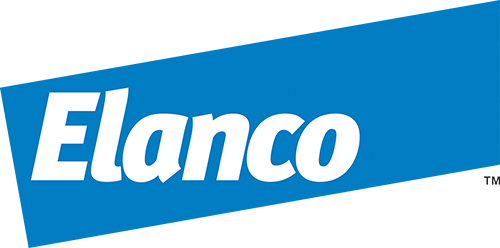Survey highlights pig health worry ahead of zinc oxide ban
 © Tim Scrivener
© Tim Scrivener Weaning can be a stressful time for piglets and, when not managed correctly, can predispose them to conditions such as post-weaning diarrhoea (PWD).
Zinc oxide has traditionally been fed after weaning to manage the transition, as it can help decrease the incidence of scouring, maintain daily liveweight gains, and allow pigs to develop better disease resistance.
However, with a ban on zinc oxide being imposed from mid-2022, we ask what pig producers are doing to prepare and take a look at the effects of PWD on UK herds. Farmers Weekly conducted a survey of UK pig producers in partnership with Elanco to find out more.
More than one-third of pig farmers are still routinely using zinc oxide in pigs after weaning, and 60% have no plan in place for when it is banned in 2022, according to the survey.
Of the survey’s 150 respondents, who had an average mean herd size of 470 sows, 36% said they were using zinc oxide. The main reasons were:
- to minimise PWD (38%)
- to make the weaning transition easier (35%).
While two-thirds of producers were aware a ban on zinc oxide was being imposed from 2022, worryingly, 33% said they were not aware of the change.
See also: 3 tips to help cut zinc oxide from weaner diets
Furthermore, three in five respondents who knew the ban was coming into effect said they had no plan in place for when zinc oxide is removed from diets, with one-third admitting they had not even considered it and another quarter saying it was not yet a priority.
Vet Mandy Nevel, head of animal science at AHDB Pork, said farmers need to start making it their priority and look at how they are going to remove zinc oxide from diets sooner rather than later.
“Producers need to start looking at it now with their vet and nutritionist. If they have a setback now, at least they can reintroduce zinc, but if they leave it too late, that option won’t be there.”
She said there was no silver bullet to replace zinc oxide and each plan should be farm-specific. “It is important you talk to your vet and nutritionist as a team. Those who are prepared and plan now for the removal will do better than those who are not,” she adds.
Effects of PWD
PWD is one of the main reasons farmers reported using zinc oxide, with more than half of respondents admitting they experienced some problems with the condition.
PWD mostly affects piglets in the first two weeks after weaning, due to:
- Change in diet from digestible milk protein and sugars to solid feed
- Shrinkage of finger-like projections in the gut (villi), which reduces digestive and absorptive surface area, allowing nutrients to pass further down the gut into the large intestine where most bacteria reside (source: Nadis)
- Stress due to a change in housing environment and competition when groups are mixed, which can lead to a reduction in feed intake
- A new housing environment and exposure to new microbes.
The symptoms include diarrhoea, dehydration, significant mortality and loss of bodyweight.
Producers experiencing an issue with PWD in their herd said it cost their business £500/year on average, with one in four producers admitting they did not know the true cost.
Reduced growth rates were reported by 82% of respondents to be the biggest issue, followed by increased finishing times and mortality.
Five ways to improve weaning management
1. Improved hygiene
a. Thoroughly disinfect between batches
b. Operate a true all-in, all-out system
2. Vaccinate
a. Where E coli is an issue, vaccination may be a suitable option
3. Transition management
a. Introduce creep feed before weaning
b. Manage weaning weights – later weaning and heavier weaning weights can reduce PWD
c. Promote feed and water intakes
4. Nutrition
a. Reduce crude protein levels in diets – this will prevent an excess of undigested protein reaching the large intestine, which can contribute to pathogens such as E coli. However, there is a balance, as requirements for amino acids (the building blocks of proteins) are high
b. Feed additives such as probiotics may be another option
5. Reduce stresses at weaning
a. Don’t overstock
b. Make sure adequate feed and water trough space
c. Minimise mixing of groups
d. Have a controlled environment
Managing PWD
Organisms such as E coli, salmonella and rotavirus are the main causes of PWD. Identifying the cause is crucial for accurate treatment and prevention.
However, according to the survey results, almost half of the producers (47%) experiencing PWD did not know the cause, with a further 39% reporting E coli as the main trigger.
Ms Nevel stresses the importance of getting an accurate diagnosis from a vet to identify the main cause, so it can be correctly treated and managed.
Antibiotics are often used to treat PWD, with more than half of respondents saying they used antibiotics to treat an outbreak when clinical symptoms appeared.
Most farmers tried to manage the condition by improving hygiene (66%) and through nutrition (49%).
Surprisingly, the survey found the uptake of vaccination among farmers was low, despite a vaccine being available for the control of PWD caused by E coli.
Antibiotics
The survey further highlighted concerns that farmers may become more reliant on antibiotics to control the issue when zinc oxide is banned, with half of the survey respondents predicting the amount of antibiotics they used would rise after the ban.
Ms Nevel says unless farmers act now, an increase in antibiotics use could be a real possibility.
“Zinc oxide is widely used and some producers do see good results from it. However, we could see an increase in antibiotics if producers do not work with their vet and talk with their nutritionist to come up with a plan.”
Why is zinc oxide being banned?
Zinc is a heavy metal and the absorption of zinc from zinc oxide is particularly low, which means most zinc given to pigs can build up in their manure and could be a possible contaminant to soils and groundwater.
It is mainly because of these environmental concerns that, in 2017, the European Medicines Agency (EMA) decided the benefits of preventing diarrhoea in pigs did not outweigh the risk.
By June 2022, all EU member states will have to withdraw marketing authorisations for veterinary medicinal products contain zinc oxide.
Thanks to Elanco for its sponsorship, which made this research possible. Farmers Weekly had full editorial control of the article.
Sponsor’s message
 Elanco is proud to sponsor this research aimed at understanding the potential impact of zinc oxide removal in 2022 on piglet post weaning performance.
Elanco is proud to sponsor this research aimed at understanding the potential impact of zinc oxide removal in 2022 on piglet post weaning performance.
Elanco is committed to continually improving piglet gut health and maximising Intestinal Integrity.
Through this research, Elanco looks to provide alternative strategies to improve gut health and performance when E coli is the main cause.
![]()
